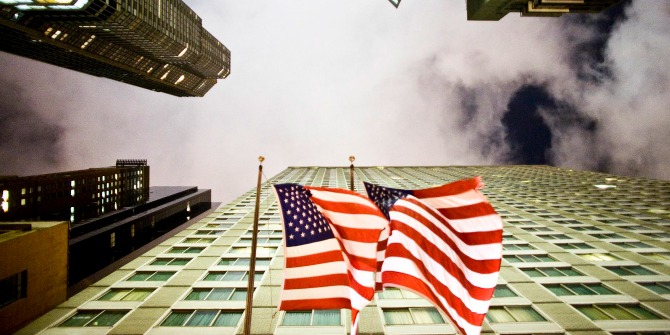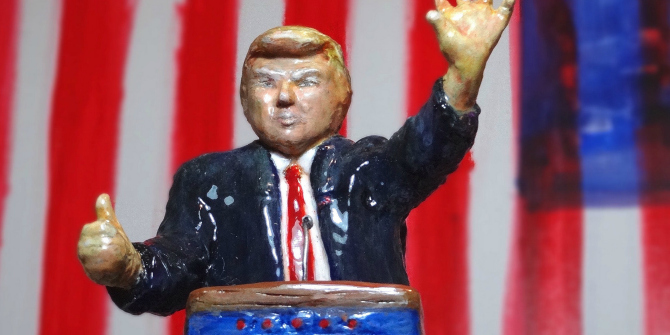Walter Dean Burnham, of the University of Texas, Austin, warns that with Donald Trump’s victory amidst the rise of the alt-right, America should prepare itself for a tumultuous roller-coaster of a presidency over the next four years.
The triumph of Donald Trump was shockingly unexpected. Two technical failures played a particular role: the failure of the media and their allies, the pollsters. The media, concentrated in New York and Washington, were populated by the well-educated and were (reasonably) well-paid professionals who were also blindsided by their lack of awareness of the chasm that had opened with the “vast middle” in the non-coastal hinterland. The failure of the pollsters was as spectacular as the prognosticators of 1948, and with less excuse after the passage of more than a half century.
The widespread sense of dissatisfaction with a status quo in the politico-governmental realm, in the wake of the near-collapse of the financial – and, hence, the national economic system in and after 2008 – had reached huge proportions. This was a “change” election.” Say what one wishes about Donald Trump’s unfitness for the Presidency which he has now won, he was obviously the “change candidate,” promising reactionary revitalization in response to a present deemed by himself to be intolerable.
Then there was his opponent, Hillary Clinton. Vastly experienced, yes; but too obviously yesterday’s candidate. And in the course of some decades in public view, the Clintons had become very wealthy and acquired a great deal of baggage.
We can spare those who access this blog many details readily available from British media. Instead, let us turn to the profound views of Martin Wolf in a volume published in 2014, before the advent of Donald Trump in American electoral politics (The Shifts and the Shocks) (NY: Penguin). Wolf’s view of the current state of affairs very closely parallels my own:
(351): Inevitably, such crises… help undermine belief that a globalizing economy is of benefit to the vast majority of people. They make people anxious and angry and rightly so. Angry and anxious people are not open to the world. They want to hide in their caves, together with similarly angry people. This is what happened in the 1930s. Financial crises are the events most likely to bring the world back there.
Equally inevitably, crises undermine confidence in the elites. In democratic societies, a tacit bargain exists between elites and the rest of society. The latter say to the former: we will accept your power, prestige and prosperity, but only if we prosper too.
A huge crisis dissolves that bargain. The elites come to be seen as incompetent, rapacious, or, in this case, both. The political results may come slowly. But come they will. Here then are the huge failures of the Western elites.
The economic, financial, intellectual and political elites misunderstood the consequences of financial liberation. Lulled by fantasies of self-stabilizing financial markets, they not only permitted but encouraged a huge and, for the financial sector, profitable bet on debt.
(352) The policy-making elite failed to appreciate the risks of a systemic breakdown. The financial elite was discredited by both its behavior and its need to be rescued. The intellectual elite was discredited by its failure to anticipate a crisis, or agree on what to do after it had struck. The political elite was discredited by their willingness to finance the rescue, however essential it was.
The decline in confidence in these elites is even worse if the methods used to rescue the economy then make the parts of the elite most associated with the crisis richer than before. This undermines the sense of fairness that underpins the political economy of capitalism. There has to remain a belief that success is earned, not stolen or handed over on a platter….
The loss of confidence in the competence and probity of elites inevitably reduces trust in democratic legitimacy. People feel even more than before that the country is not being governed for them, but for a narrow segment of well-connected insiders who reap most of the gains and, when things go wrong, are not just shielded from loss, but impose massive costs on everybody else. This creates outraged populism, on both the Left and the Right.
(381-383)… Elites, have failed and, as a result, elite-run politics are in trouble. Throughout the high-income countries one sees the emergence of populist political forces – xenophobic populists of the right and egalitarian populists of the left. What these share is an ability to muster the inchoate anger of the disenchanted and the enraged who feel, understandably, that the system is rigged against ordinary people.
History suggests that such anger will not end well. Often it has ended up with authoritarian rule, civil war or external war…
So, here we are! Clinton won a clear plurality in the popular vote, but Trump won where it counted: the electoral vote. If very narrow leads hold up, by 306 for Trump to 232 for Clinton. The Democrats, as a whole, were also a pitiful study in failure. Large demonstrations flared in many cities. The crisis of extreme polarization will, I think, get even worse over the next 4 years. The alt-right and its allies are in charge, and the public policies by the rest of this decade will follow.
The USA will, I suspect, have the equivalent of a Nantucket Sleigh ride. This phenomenon of the early 19th Century was found in the whaling trade (see Herman Melville’s classic, Moby Dick). When a whale was spotted, harpooners were lowered, and when a harpoon landed, the whale took off at full speed. Thus the Nantucket sleigh ride. Something very like it will be launched nationwide on January 20, 2017. Hold on to your hats!
For one of my views, the prospects are bleak in the extreme.
Featured image credit: Donald West from Richmond, Virginia, United States of America (Tour de Trump) [CC BY 2.0 ], via Wikimedia Commons
Please read our comments policy before commenting.
Note: This article gives the views of the author, and not the position of USApp– American Politics and Policy, nor of the London School of Economics.
Shortened URL for this post: http://bit.ly/2gl9I1m
______________________
About the author
 Walter Dean Burnham – University of Texas at Austin
Walter Dean Burnham – University of Texas at Austin
Walter Dean Burnham is Professor Emeritus at the Department of Government at the University of Texas at Austin. Professor Burnham is best known for his work on the dynamics of American politics (particularly electoral politics). His chief areas of concentration have been on the causes, characteristics and consequences of critical realignments in American history, and the modern-day decay of partisan linkages between rulers and ruled. Much of his recent work has also concentrated on the “turnout problem” and its relationship to other elements of change in American politics. Before coming to Texas in 1988, he was Ruth and Arthur Sloan Professor of Political Science at Massachusetts Institute of Technology.






